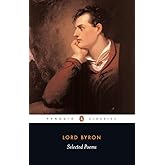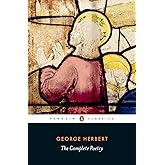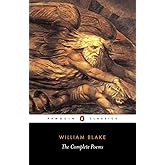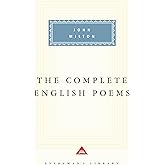
Download the free Kindle app and start reading Kindle books instantly on your smartphone, tablet, or computer - no Kindle device required.
Read instantly on your browser with Kindle for Web.
Using your mobile phone camera - scan the code below and download the Kindle app.

Follow the authors
OK
Selected Poetry (Oxford World's Classics) Reissue Edition
Beginning his career as an engraver, it was not until his thirties that William Blake distinguished himself as a poet. This new edition of Blake's verse, presented in hronological order, encompasses Blake's entire career, from is early Poetical Sketches and There is No Natural eligion through his best known work Songs of Innocence, part of his beautiful series of poetry in lyric and blank verse, to his later works Jerusalem and The Everlasting Gospel. Representing the full range of Blake's accomplishements as a poet, this outstanding volume highlights the extraordinarily diverse achievements of his remarkable poetic oeuvre.
About the Series: For over 100 years Oxford World's Classics has made available the broadest spectrum of literature from around the globe. Each affordable volume reflects Oxford's commitment to scholarship, providing the most accurate text plus a wealth of other valuable features, including expert introductions by leading authorities, voluminous notes to clarify the text, up-to-date bibliographies for further study, and much more.
- ISBN-100199537534
- ISBN-13978-0199537532
- EditionReissue
- PublisherOxford University Press
- Publication dateSeptember 15, 2008
- LanguageEnglish
- Dimensions0.75 x 4.75 x 7.5 inches
- Print length311 pages
From #1 New York Times bestselling author Colleen Hoover comes a novel that explores life after tragedy and the enduring spirit of love. | Learn more
Frequently purchased items with fast delivery
From the Publisher


Editorial Reviews
About the Author
Product details
- Publisher : Oxford University Press; Reissue edition (September 15, 2008)
- Language : English
- Paperback : 311 pages
- ISBN-10 : 0199537534
- ISBN-13 : 978-0199537532
- Reading age : 13 years and up
- Item Weight : 8.6 ounces
- Dimensions : 0.75 x 4.75 x 7.5 inches
- Customer Reviews:
About the authors

Blake was a poet, painter, engraver and mystic.

Discover more of the author’s books, see similar authors, read book recommendations and more.
Customer reviews
Customer Reviews, including Product Star Ratings help customers to learn more about the product and decide whether it is the right product for them.
To calculate the overall star rating and percentage breakdown by star, we don’t use a simple average. Instead, our system considers things like how recent a review is and if the reviewer bought the item on Amazon. It also analyzed reviews to verify trustworthiness.
Learn more how customers reviews work on AmazonTop reviews from the United States
There was a problem filtering reviews. Please reload the page.
- Reviewed in the United States on May 13, 2019This is a great entry point to begin exploring the poetry of one of English literature’s great visionaries. Blake’s poetry can make for challenging reading, especially his epic poems which are full of allusions to the Bible, to history, to famous philosophical works and also to individuals who were important in his own life. And, to make it even more difficult, many of the mythological figures who appear in these poems were Blake’s own creations, the nature of whom we have to try to pick up from the context. (The footnotes help to make sense of the allusions and also explain some of the archaic words Blake uses.)
For a long time I thought of Blake as someone who had a big impact on my view of the world, even though I had only read a handful of his poems. While London, The Marriage of Heaven and Hell and The Everlasting Gospel spoke to me like the voice of a friend to one lost in a wilderness, the prospect of reading his epic works was daunting. The beauty of this collection is that it contains much of his shorter work, including the entirety of Songs of Innocence and Songs of Experience, along with extracts which can be read alone from two of his epic poems - Milton and Jerusalem. This helped to give me confidence that I will be able to read them in their entirety at some time. I was also inspired to buy The Blake Dictionary, The Ideas and Symbols of William Blake by S. Foster Damon and Morris Eaves to help with this.
An argument could be made that the way to read Blake’s poems is as he presented them, illustrated with his drawings and paintings. Still, I think there are advantages to reading the text on its own. His words conjure up images which are more powerful than his pictures, amazing as they are. I would recommend reading the poems on their own and then seeking out the illuminated versions afterwards.
What I relate to particularly strongly in Blake’s writing is his vision of the entrapment of the human soul within the repressive structures of society. “A robin redbreast in a cage sets all Heaven in a rage” was not just some superficial animal rights statement, it was a cry for freedom from repression of the human spirit.
Good and evil, in Blake’s eyes, were not so simple to distinguish. He used the term “moral virtue” to label a form of self-righteous judgement which viewed itself as good, but was the enemy of love and love’s forgiveness. By contrast the vital energy we feel in our bodies might be viewed as a source of sin by the church, but, by Blake, as a source of “eternal delight” for “everything that lives is holy.”
Blake’s was very much a pantheistic vision. The divine was always present in nature, and, while he had visions of angels and demons, he didn’t believe, in a literal sense, in miracles which defied the laws of nature. He didn’t believe that Mary was a virgin (Jerusalem, Chapter III, lines 369-393), and from this he draws his own vision of Jesus as a child of love and of liberation from the law’s oppression of love. Mary was impregnated in an act of love unsanctioned by the law. Joseph, discovering that his betrothed was carrying another man’s child, had to exercise forgiveness in keeping with God’s forgiveness of human sinfulness, and love for life rather than for the law, to marry Mary. Thus, in his very conception and the family circumstances into which he was born, Blake sees Jesus as an embodiment of love supplanting law.
I don’t believe in the supernatural, so that kind of religious belief which depends on belief in literal resurrection of the dead, etc., is not accessible to me. William Blake is someone who helps me to draw inspiration and hope from religious visions in a metaphorical sense. If we can cleanse our “doors of perception” perhaps we can achieve a “Marriage of Heaven and Hell” and “build Jerusalem” in our own “green and pleasant land.”
Top reviews from other countries
 eloquentReviewed in the United Kingdom on March 3, 2013
eloquentReviewed in the United Kingdom on March 3, 20135.0 out of 5 stars THE GREATEST POET WHO EVER LIVED!!!
Has all the major poems and a bit more
William Blake in my view was the greatest poet who ever lived,
and will always be my favourite
 OxaneReviewed in the United Kingdom on January 28, 2013
OxaneReviewed in the United Kingdom on January 28, 20134.0 out of 5 stars Ok!
I needed it for my studies and I really appreciated it yet it is not one of my favourite poets.











